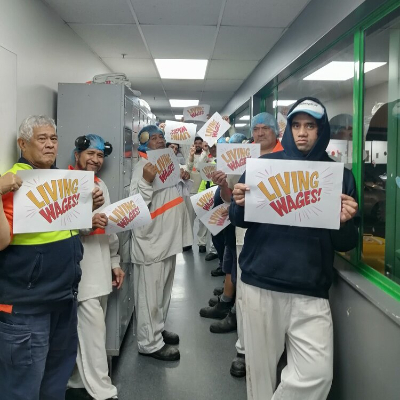Tip Top Bread Workers Back In Bargaining As Union Launches Food Made Fair Campaign
Next week, Tip Top bread workers are going back into pay negotiations with their employer for the first time since their strike in 2019 caused a national bread shortage.
FIRST Union represents the majority of employees at George Weston Foods’ two Auckland sites, in Otahuhu and Manukau, which are covered by the Collective Agreement being renegotiated. Union members met last week and set a mandate for no worker to receive any less than the living wage, which will be $22.75 from 1 September 2021. A petition signed by members will be delivered to the company on the first day of bargaining next week.
"Despite last week's Commerce Commission report confirming our supermarket prices are sky-high compared to other countries, workers in our food supply chains are often paid less than the living wage," says FIRST Union spokesperson Anita Rosentreter.
"Tip Top workers are also aiming to improve on the overtime rates they won through their strike in 2019. It was a major win, but there’s still some room for improvement as these workers regularly work 50 hours a week, sometimes up to 60."
This comes as FIRST Union launches its new Food Made Fair campaign, which aims to promote decent work in food supply chains. It has three pillars: living wages, job security and local sourcing.

Picture: Tip Top workers from Auckland calling for living wages.
FIRST Union covers workers in all parts of the country's food supply chains, from orchards and hot houses, to processing and manufacturing, transport and distribution, and supermarkets. The campaign seeks to create opportunities for those workers to build solidarity and work together to make gains.
In late 2019, George Weston Foods’ workers took strike action after a prolonged and contentious bargaining round, which resulted in a national bread shortage. Workers say some of the issues they raised at the time were resolved, but others were not, including getting agreement around living wages.
"These workers are passionate about feeding New Zealanders, but they sometimes can’t even afford to put food on their own tables - it’s just wrong," said Ms Rosentreter.
"Food is the essence of life and the workers who handle it deserve respect, decent work and living wages."


 NZ Airports Association: Airlines And Airports Back Visa Simplification
NZ Airports Association: Airlines And Airports Back Visa Simplification Netsafe: Statement From Netsafe About Proposed Social Media Ban
Netsafe: Statement From Netsafe About Proposed Social Media Ban The Reserve Bank of New Zealand: 2024 General Insurance Stress Test Results Published Today
The Reserve Bank of New Zealand: 2024 General Insurance Stress Test Results Published Today  Worldline: School Holidays And Long Weekends Change Regional Spending Patterns In April
Worldline: School Holidays And Long Weekends Change Regional Spending Patterns In April Stats NZ: Livestock Numbers Fall Over The Last 10 Years While Area Planted In Fruit Increases
Stats NZ: Livestock Numbers Fall Over The Last 10 Years While Area Planted In Fruit Increases Moths and Butterflies NZ Trust: Tagged Monarchs Found
Moths and Butterflies NZ Trust: Tagged Monarchs Found